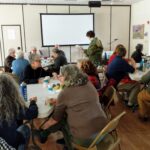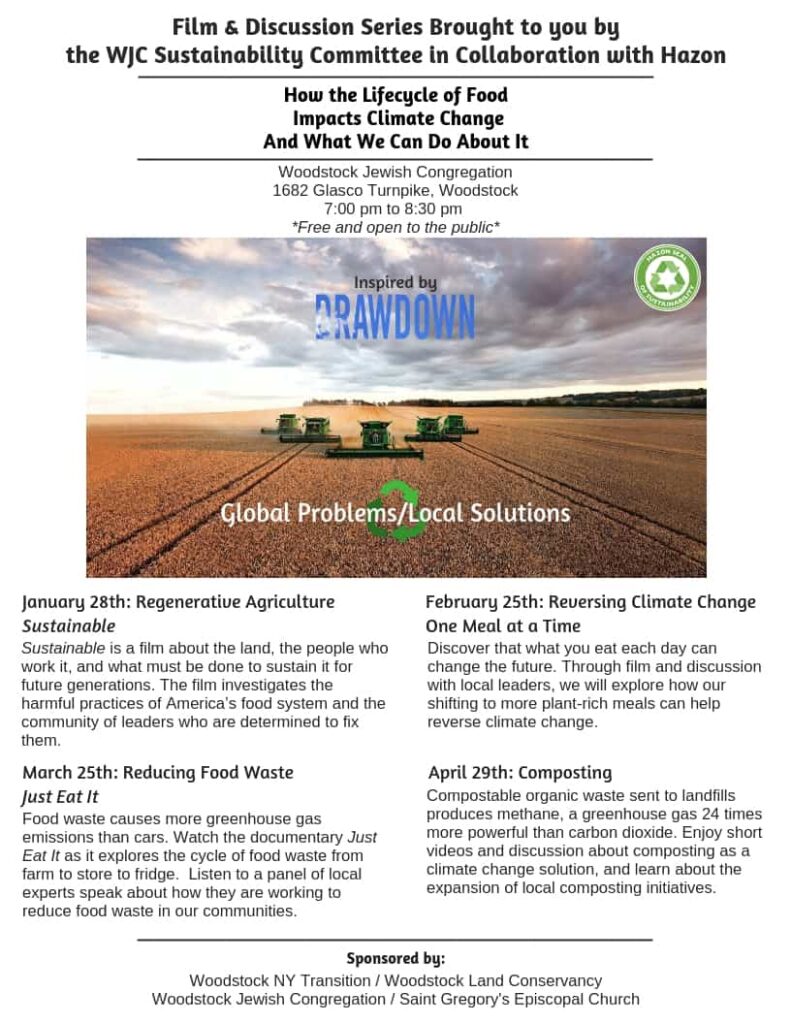Woodstock Jewish Congregation (NY)
By Gail Albert
Please see below for an article about the Woodstock Jewish Congregation movie series and other sustainable initiatives. This is a prominent example that no matter where you on your sustainability journey – the Hazon Seal is here to support you. The Woodstock Jewish Congregation was ahead of the game, yet continuously works to increase its impact and inspire us all.
For any questions or comments for Woodstock Jewish Congregation, please reach out to us and we are happy to make the shidduch!

[myspacer h=”20″]
Background
The Woodstock Jewish Congregation is a 350 member non-affiliated synagogue in Woodstock NY. Most of us have come from the NYC metropolitan area, and many are still week-enders, but the county is semi-rural, and has only two or three other synagogues. We are generally active around social justice issues, but we have not made environmental activism—particularly in regard to climate change—as much of a priority, nor have we linked it as much with Jewish values.
Some of this imbalance is rooted in Jewish history, but it has also arisen from a sense of powerlessness—even despair–in the face of our government’s inaction to what most of see as looming disaster.
Before joining Hazon, we created our Green Team with the goal of promoting environmental activism on an individual and community basis by a combination of creating hope and linking action to Jewish teachings. In 2018 we sang even more High Holiday prayers and songs about the Earth’s holiness than in the past. Our services are held in a huge tent that holds about a thousand people, and it is extraordinary when we all sing, “Take off your shoes. The ground you are standing on is holy ground.” We also held a Sukkot weekend shabbaton on Organic Torah by R. Natan Margolit, and we served all food on dishes and silverware.
At the time we joined Hazon in January 2019, the shul was in the process of changing all our lighting, inside and out, to LED’s. This grew out of our utility company’s need to reduce overload on the electric grid, and, after some negotiation, the utility agreed to pay the entire cost of parts and labor. Our electric usage the next month was about one-third what it had been before, a major environmental difference.
In addition, we began to address our sense of powerlessness by adding brief notes to our weekly email as to environmental actions the shul had already taken. For example:
#1: No Beef at our Kiddush: Yes, we are a shul, so we stay away from meat at kiddush. But it turns out we are also helping the planet. If one beef-based meal is swapped each week for eggs, veggies or beans, it avoids releasing about 700 pounds of carbon dioxide every year. And if we all stopped eating beef, the US would meet more than half its 2020 climate target! So look what you are doing by having lunch at our Saturday kiddush!
#2: Supporting Local Farming: Did you know that we host a local CSA pickup on Wednesday afternoons in summer? By letting the CSA use our synagogue, we are helping to encourage local farming and strengthening our local economy—and even keeping the landscape beautiful. AND when we buy local produce—in our food stores as well—we reduce our carbon footprint by 5 to 17 times as compared to conventional food distribution!
[myspacer]
Woodstock’s Monthly Movie Series
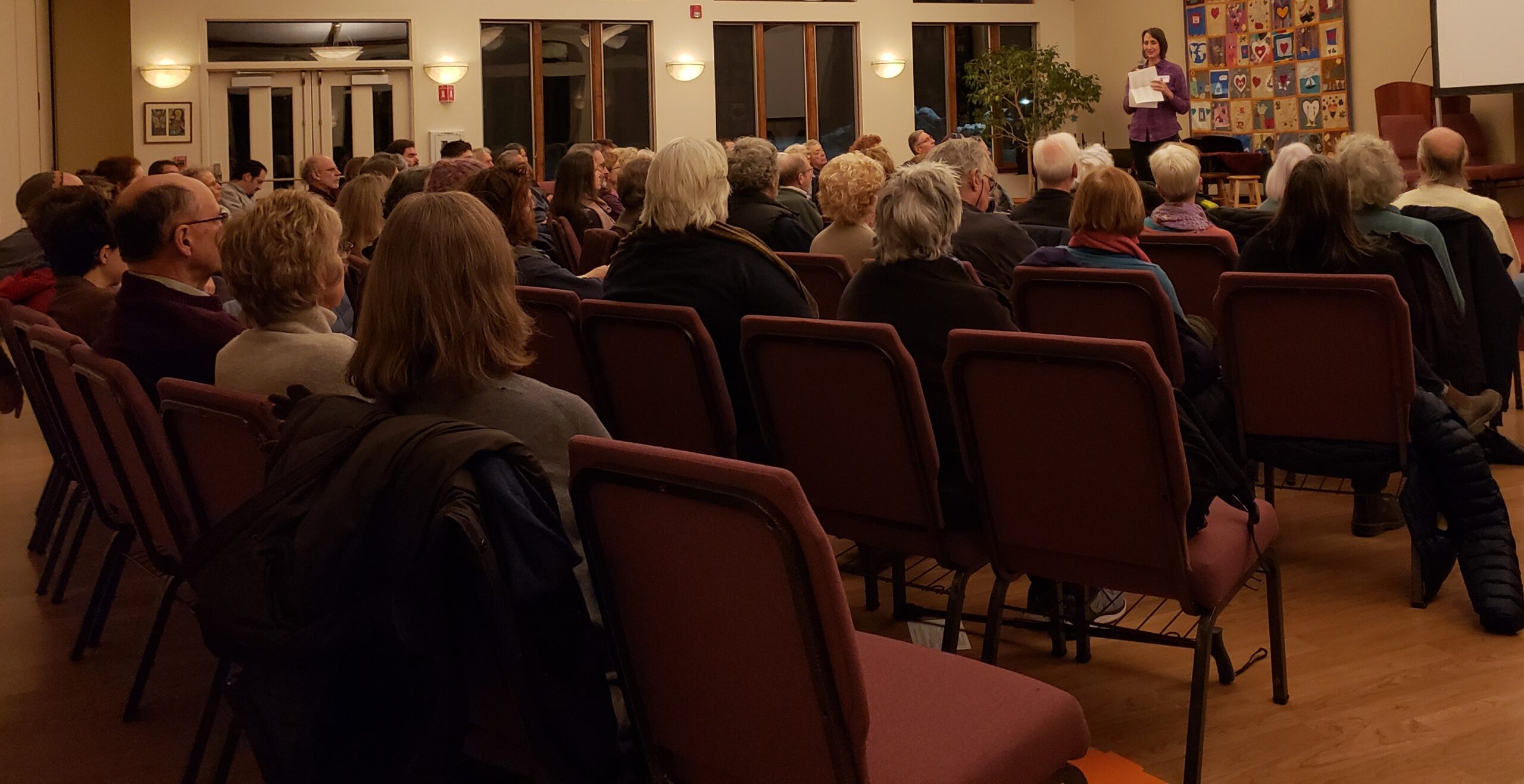
In January, we began our first major initiative in the Hazon Seal Program, a four-part monthly movie series. There were three aspects to this. First was the desire to expose folks to the major game changer in any discussion of the climate: Project Drawdown: 100 Solutions to Reverse Climate Change. This scientific initiative led by Paul Hawken and Bill McKibben rank orders 100 ways we can reverse climate change in terms of their effectiveness and net cost; and learning about Drawdown immediately changes the conversation from despair to hopefulness, and with that, creates readiness to be part of the solution.
We also approached local environmental organizations that had already created environmental movie series, and asked to join with them this year. We also brought in a local Episcopal church with whom we have shared other events, so we now had two secular and two faith-based organizations. We offered to host all the events at our shul without any charge, lowering the usual expenses markedly and enabling us to welcome people who would never otherwise find themselves feeling at home in our shul. We had joined Hazon to connect with the larger world of the Jewish environmental movement. We now had expanded our connections within our local community as well.
We decided to focus on four issues around food, because everyone eats, and because eating plant-based diets and reducing food waste were in the top five solutions in Project Drawdown. We bookended these two subjects with a first event on sustainable farming and a final one on composting. The overall series was called Global Problems/Local Solutions. The fascinating films were called Sustainable for the first event and Just Eat It for reducing waste.
Each event began with an introduction to Project Drawdown, then a film/video about the food subject, and closed with Q&A and discussion. For three of the events, we also invited local experts on the subject; for example, for plant-based diet we brought in a well-known scientist in the field as well as the vegan director of a local sanctuary for farm animals.
Each organization publicized each event inhouse, and the events were listed in the local paper and in fliers distributed in Woodstock. Even so, we were astonished to get between 85 and 110 people altogether at each event. A number of people have said it created changes in their behavior and even changed their life.
It also gave many attendees their first experience with a shul, particularly because the events were all held within our sanctuary, in front of the ark. And because our committee posted relevant Jewish quotes about environmental activism on the entry doors and some of the walls, people had at least a little exposure to Jewish teaching.
Click here for Woodstock’s 3 movie flyers!
[myspacer]
Onwards and Upwards: Brunch and Environmental Shabbat
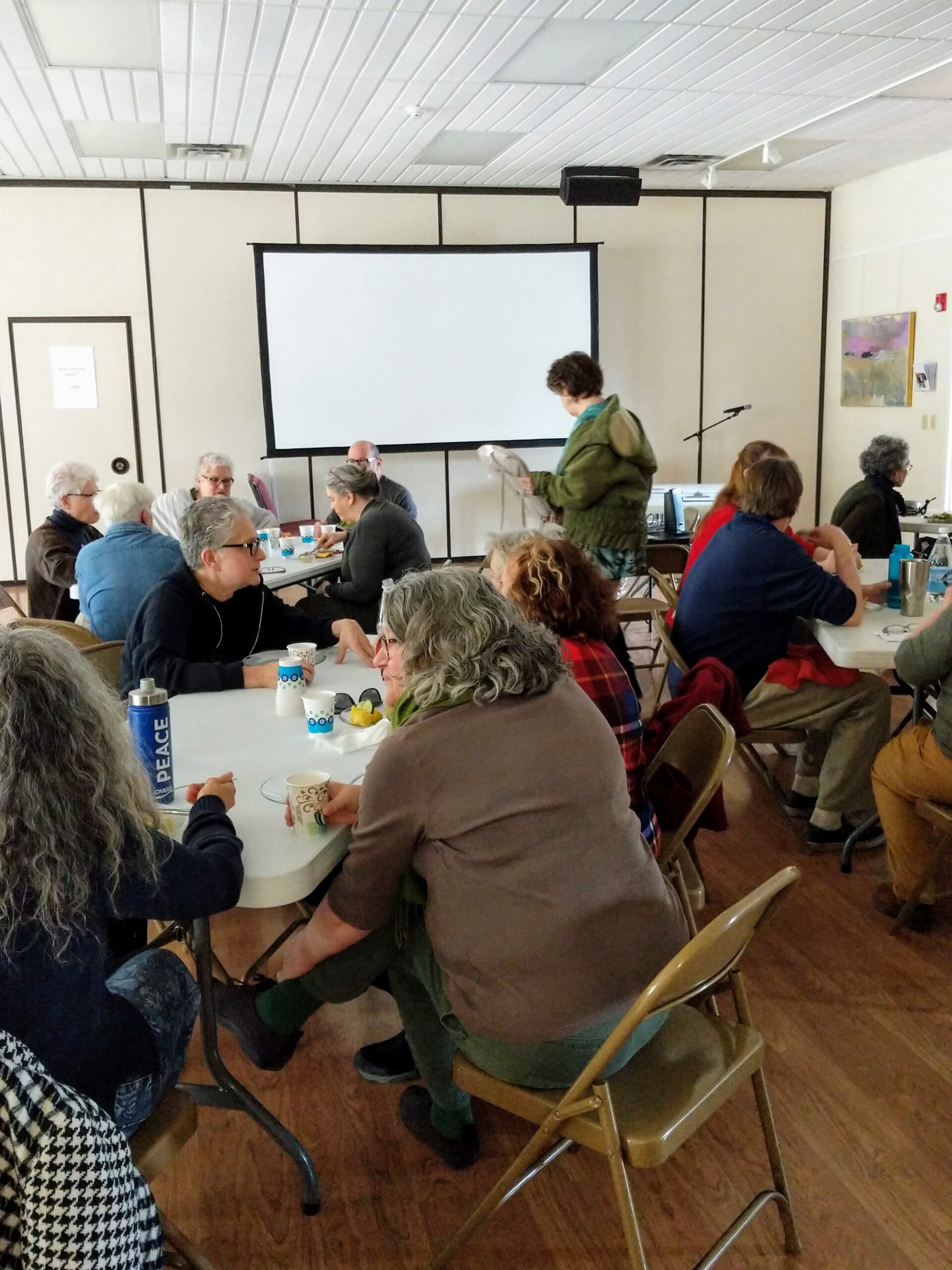
Our Green team also organized a brunch for members of the congregation in order to present Project Drawdown, Hazon, and our membership in the Hazon/Seal program. We began with a Drawdown video, then a video about Hazon and the Seal Program, then slides showing what the shul has already done, and closed with what we are doing this year in the Seal Program.
In April, using parshot in Leviticus, we also offered two D’var Torah’s about plant-based diets. Our Hallal service around the time of Earth Day was focused on the glory and holiness of Creation; and we took part in a community-wide interfaith Earth Day chanting service. Our Rabbi interweaves prayers and songs on the holiness of the Earth and Creation into every service, and has become very clear about the need to act on climate change.
While we don’t know how congregants are changing at home, our sense is that all of these efforts have begun to create a change in the atmosphere at the shul. It shows mainly at our kiddushes (which are essentially vegetarian or even vegan), for hosts are now likely to set out real dishes instead of paper plates, plastic has been entirely displaced by silverware, and congregants are delighted at how little we are contributing to the landfill. Even more, we are finally bringing in more volunteers to host and clean up. We look forward to what the rest of the year will bring.
Thank you, Woodstock Jewish Congregation, for always striving to reach new heights!
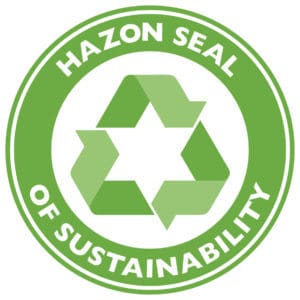 Want to bring the Hazon Seal of Sustainability to your community? Learn how.
Want to bring the Hazon Seal of Sustainability to your community? Learn how.
